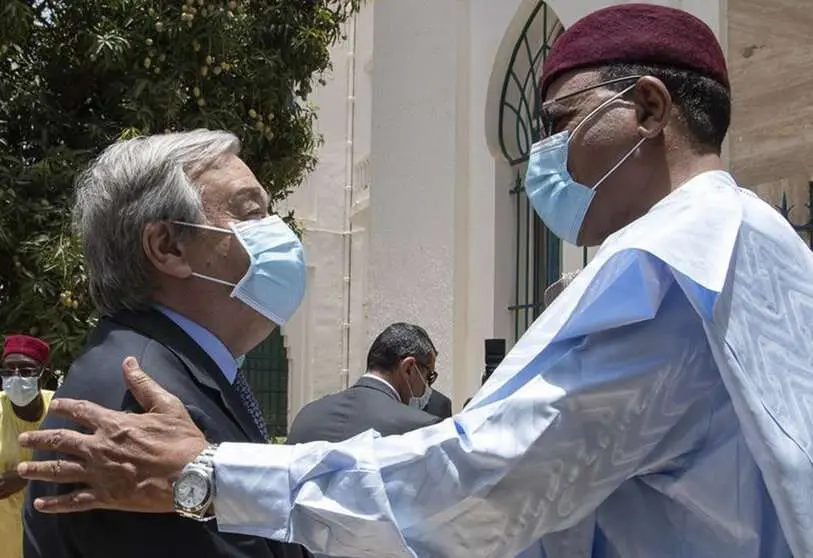More resources needed to fight terrorism in the Sahel, says Guterres in Niger

The number of terrorist attacks in Africa's Sahel region "continues to rise," according to UN Secretary-General António Guterres, who arrived Monday in Niger's capital Niamey, the second of three countries he is visiting on a tour of West Africa for the Muslim holy month of Ramadan.
After meeting Niger's President Mohamed Bazoum, he said the "international community must realise" that terrorism "is not just a regional or African issue, but threatens the whole world". He reiterated his call for more resources to combat the problem, saying that "peace, stability and prosperity in Niger and throughout the Sahel remain an absolute priority for the United Nations".
President Mohamed Bazoum acknowledged Guterres' commitment to finding a solution to the problem of terrorism, saying it is "dynamic and has evolved and we have to adapt our response".
Meanwhile, Niger's former president, Mahamadou Issoufou, accepted a request from the AU chairperson and the UN secretary-general to lead a joint AU-UN strategic assessment on security in the Sahel, focused on developing recommendations on how to strengthen the overall international response to the security crisis in the Sahel.
The assessment will be conducted in consultation with the Economic Community of West African States (ECOWAS) and the Group of Five (G5) Joint Secretariat.

The UN says insecurity in Niger is driven by a variety of actors and, as the UN leader noted, "civilians are often the first victims" when violence strikes. Figures indicate that almost eight out of ten victims of attacks are civilians.
Various extremist armed groups operate mainly in the regions of Tillabéri, Tahoua and Diffa, in the northwest, south and southeast of the country respectively. In the Maradi region in the south, armed groups operating from Nigeria frequently cross the border to carry out raids; bandits with weapons inside Niger are also a major threat.
In 2021, the Global Terrorism Index attributed 588 deaths to terrorism in Niger, the highest number of terrorism-related casualties in the past decade. In the Tillabéri region, deaths more than doubled between 2020 and 2021.
Insecurity is just one part of what the secretary-general called "a multidimensional crisis of extraordinary scale". Climate change, rising food insecurity, malnutrition and record food prices, fuelled by the war in Ukraine, have all contributed to unprecedented humanitarian needs.

The UN says the number of acutely food insecure people has more than doubled since 2020 and estimates that 15% of Niger's 25 million people will need humanitarian assistance by 2022.
In a country where 80% of the population depends on agriculture for their livelihoods, insecurity and climate change have contributed to their inability to feed themselves.
The 2019 Human Development Index, which measures life expectancy, education and income indicators, ranks Niger as the least developed of the 189 countries on the list.

Despite the many challenges facing Niger, the UN Secretary-General told the media in Niamey that there is still "hope" and that the UN must live up to that hope and support Niger's youth, and especially women, to access opportunities to create a better future.
"A positive momentum in Niger" could lead to a virtuous circle of change across the region, added Guterres, who travels to Nigeria on Tuesday.








